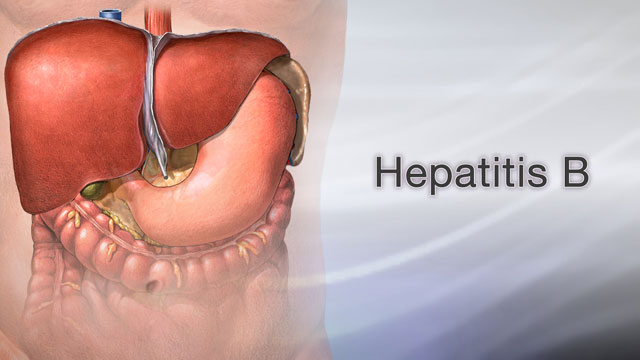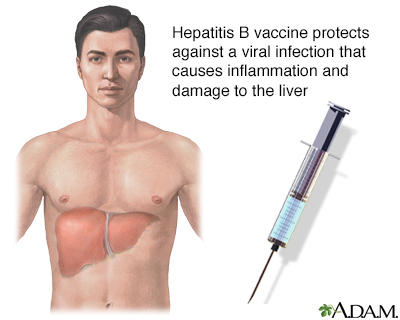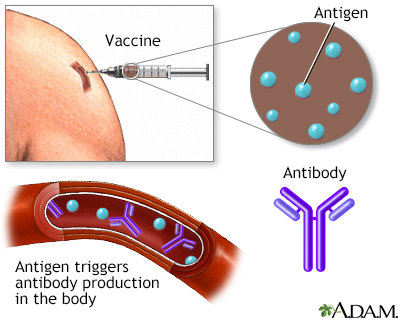Hepatitis
Hepatitis is swelling and inflammation of the liver.
Hepatitis is swelling and inflammation of the liver.

Animation

Animation

Animation

Illustration

Illustration

Illustration

Illustration

Illustration

Illustration
Hepatitis A - Animation
If you have noticed lately you feel weak and itch, have a loss of appetite, dark urine, and a low-grade fever, you may be suffering from symptoms of hepatitis A. Hepatitis A is irritation and swelling of the liver from infection with the hepatitis A virus. The virus is usually found in the stools and blood of an infected person. You can catch hepatitis A if you eat or drink food or water contaminated by feces containing the virus. Fruits, vegetables, shellfish, ice, and water are common culprits. You can also catch the disease if you come into contact with the blood or stool of a person who has hepatitis A, when a person who has the disease and doesn't wash their hands after going to the bathroom touches other objects or food, or if you have sex that involves oral to anal contact. Risk factors also include international travel, especially to Asia or South or Central America, IV drug use, living in a nursing home, or working in a health care, food, or sewage industry. So, what do you do about hepatitis A?Symptoms will show up about two to six weeks after you are exposed to the virus. As stated, you may well have dark urine, feel weak, have itching, a loss of appetite, a low-grade fever, feel nauseous, and have yellowish skin. The symptoms are usually mild, but they may last for up to several months. Your doctor will perform a physical exam and may discover that you have an enlarged, tender liver. Blood tests can confirm you have hepatitis A. There is no specific treatment for hepatitis A. Your doctor will recommend that you rest when your symptoms are at their worst. You should also avoid alcohol and anything else that is toxic to the liver, such as acetaminophen, or Tylenol. Keep in mind that eating fatty foods may cause you to vomit, because your liver helps process fats from your body. The good news is the hepatitis A virus does not remain in your body after the infection has gone, but you do need to maintain good bathroom habits to keep from spreading the disease. Typically, you will recover in about three months, but some people do need six months to get better. If you have recently been exposed to hepatitis A and have not had hepatitis A before or have not received the hepatitis A vaccine series, ask your doctor or nurse about receiving either immune globulin or the hepatitis A vaccine.
Hepatitis C - Animation
Hepatitis C is a viral disease that leads to swelling (or inflammation) of the liver. If you've been diagnosed with hepatitis C, you may be worrying about your health. Let's answer some questions you may have about hepatitis C. Hepatitis C is irritation and swelling of the liver from infection with the hepatitis C virus. You can get hepatitis C if you have been on long-term kidney dialysis, or have regular contact with blood at work (such as a health care worker), have unprotected sex with someone infected with hepatitis C, use injected street drugs or share a needle with someone who has hepatitis C, received a tattoo or acupuncture from contaminated instruments, although the risk is low with licensed, commercial tattoo shops, received blood or organs from a donor who has hepatitis C, share a toothbrush or razors with someone who has the disease, or were born to a mother infected with hepatitis C. Most people newly infected with hepatitis C virus will not have symptoms. About 10 percent will have jaundice (or yellow skin) that gets better. The bad news is that most people infected with hepatitis C will have it for a long time, usually with no symptoms. Typically, long-term hepatitis C infection can lead to liver scarring, a condition called cirrhosis, or even liver cancer. If your doctor suspects hepatitis C, you will need blood tests to confirm the diagnosis. If you've had the disease for a long time, you doctor can use a procedure called a liver biopsy to see how much damage has been done to your liver. You will need to take medicine to try to remove the virus from your blood and reduce your risk of cirrhosis and liver cancer. The most common medications are a combination of pegylated interferon alfa and ribavirin, an antiviral medication. Pegylated interferon alfa is an injection you will probably receive weekly. You can take ribavirin as a capsule twice a day. Treatment may last up to 48 weeks. Most people with hepatitis C have the chronic form. But some people may get better with treatment, although they may need continued testing. Even if treatment doesn't remove the virus from your blood, it can reduce your chance of severe liver disease.
Hepatitis B - Animation
If you've been diagnosed with hepatitis B, you may worry about your health and about spreading the disease to others. Let's talk about hepatitis B. Hepatitis B is irritation and swelling of the liver from infection with the hepatitis B virus. Infection can spread through contact with the blood, semen, vaginal fluids, and other body fluids of someone who already has the disease. Hepatitis B can also be passed to an infant during childbirth if the mother is infected. Most of the damage from the virus happens because of how the body responds to the infection. When the body's immune system detects the infection, it sends out special cells to fight it off. These disease-fighting cells, in turn, can cause liver inflammation. After you first become infected with the hepatitis B virus, you may have no symptoms at all. Or you may feel sick for a period of days or weeks, with some people becoming very ill. If you're body is able to fight off the infection, symptoms should go away within a few weeks to months. Early symptoms may include loss of appetite, weakness, a low-grade fever, muscle and joint aches, nausea, vomiting, or maybe yellow skin. Sometimes, your body can't get rid of the infection. If so, you have chronic (or long-term) hepatitis B. You may have few - or even no - symptoms at all. You may not even look sick. This is a problem, because people with chronic hepatitis B often do not know they're sick, and they can spread the virus to other people. If your doctor thinks you have hepatitis B, you will need blood tests to confirm diagnosis. If your disease is acute (or short-term), you may not need treatment, other than occasional blood tests to check the health of your liver and other body functions. Your doctor will tell you to get plenty of bed rest, to drink plenty of fluids, and to eat healthy foods. Some people may have chronic hepatitis and need antiviral medications or another medicine, called peginterferon. These medicines can remove hepatitis B from your blood and reduce your risk of cirrhosis (scarring of the liver) and reduce your risk of liver cancer. If you have severe chronic hepatitis B, you may eventually need a liver transplant. If you have acute hepatitis B, you will probably get better. If your infection is chronic, however, you should avoid alcohol and check with your doctor before taking any over-the-counter medicines or herbal supplements. And you will need ongoing blood tests to monitor the health of your liver.